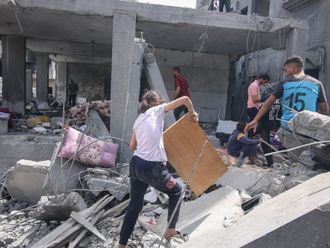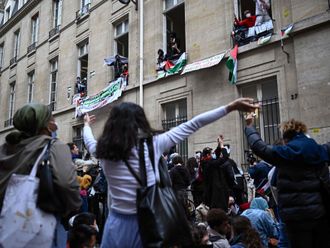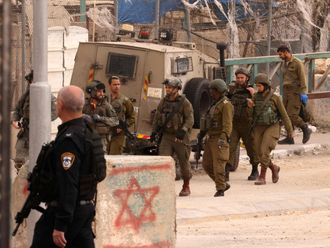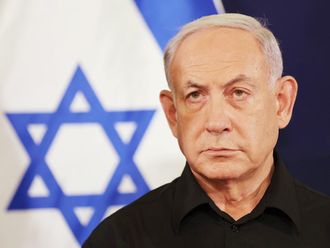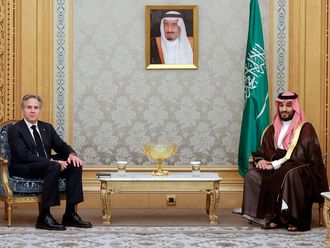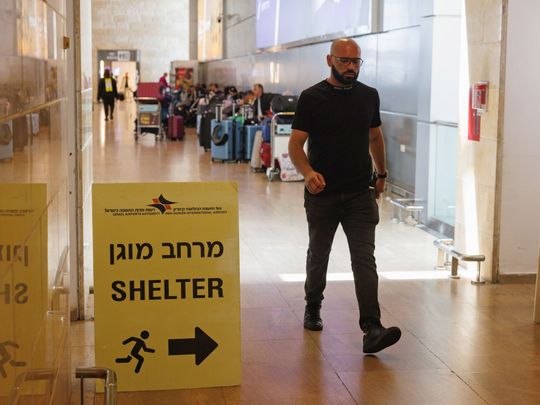
Jerusalem: Iran’s attack on Israel with more than 300 missiles and drones on Sunday marks a perilous turn for a fragile region.
It was an unprecedented action, the first strike on the Jewish state from Iranian soil. Iran declared it a massive success.
Yet with help from the US, UK and other allies, Israel stopped almost every one of the missiles and drones launched. No one was killed, and the damage minor. It too declared it an enormous success.
Both powers say their rivalry has shifted. Iran called it a “new equation” in which Israel had to know it could be attacked again; Israel said it will hit any nation that attacks it.

Leaders of G7 nations on Sunday condemned Iran’s unprecedented attack on Israel and called for “restraint” from all sides.
“We unanimously condemned Iran’s unprecedented attack against Israel”, European Council President Charles Michel wrote on X, formerly Twitter, following video talks. “We will continue all our efforts to work towards de-escalation. Ending the crisis in Gaza as soon as possible, notably through an immediate ceasefire, will make a difference.”
Israel’s allies, including the US, are eager for it to show restraint, and not raise the stakes further.
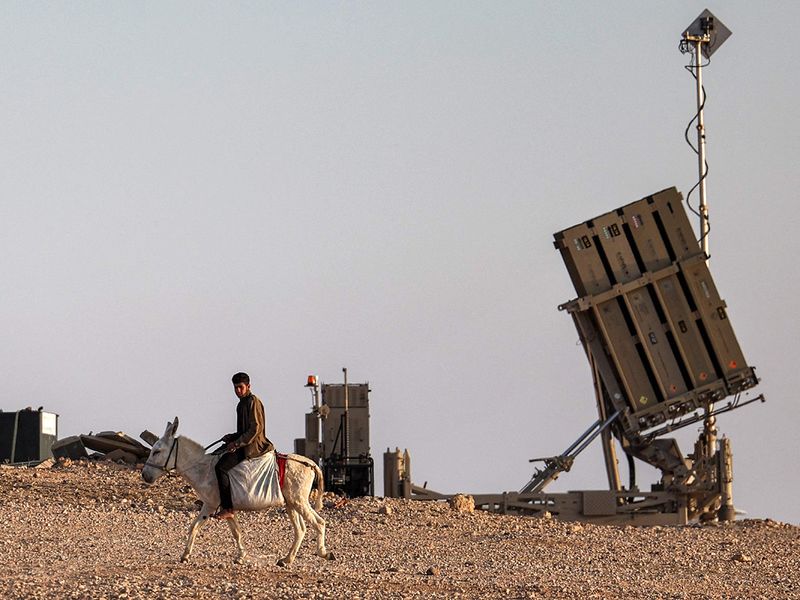
Alarms sounded in various locations in Israel, including Beer Sheva and Dimona in the south and Jerusalem, as well the Jewish settlement of Ariel in the West Bank. Residents of Jerusalem heard blasts.
Israel’s most active and well-known air defence is Iron Dome, which has intercepted thousands of rockets fired by Palestinian militants in Gaza since 2011. But Iron Dome is designed for missiles and drones with a short range, and is just one of the advanced missile-defence systems in place.
Israel also has a medium-to-long-range interceptor known as David’s Sling and the Arrow defense system.
The assault could worsen a Middle East conflict that began when thousands of Hamas operatives broke into Israel from Gaza in October. Hamas is designated a terrorist organization by the US and EU.
A direct clash between Iran and Israel could draw in the Lebanon-based group Hezbollah, which like Hamas is backed by Iran, and heighten the possibility of a regional war. Oil supplies from the Arabian Gulf could also be curtailed.
Iran backs anti-Israel and anti-US groups across the region. Together, they are often called the “axis of resistance.” They include Hamas and Hezbollah, as well as the Houthis in Yemen and militias in Syria and Iraq.
The Houthis used the war in Gaza as a pretext for missile attacks on commercial ships in the Red Sea and Gulf of Aden, while Hezbollah has exchanged fire across the border with Israel almost daily since the incursion.
The Iran-backed groups in Iraq and Syria regularly targeted US bases with missiles and drones late last year and in January. Those attacks mostly stopped after three US soldiers in Jordan were killed by a drone in late January and the Pentagon responded by striking Iran-linked facilities in the region.
Warm embrace
Many in Israel are open to that approach, partly because Iran’s attack was so unsuccessful, reducing the need for a quick show of force. It’s also because after weeks of scorn from Washington over the conduct of the war against Hamas in Gaza, Israelis felt a warm embrace once more. And that was comforting.
“Israel acted tonight for the first time as part of a coalition,” noted Tamir Heyman, a former chief of military intelligence. “That coalition is the answer to the day after the war in Gaza.”
But the forces keeping Prime Minister Benjamin Netanyahu in office — those to his right — have a different idea.
They say that if Israel doesn’t respond painfully and soon, Iran and its proxy militias across the region are likely to see weakness.
“Now we need a crushing attack,” said National Security Minister Itamar Ben Gvir, while Foreign Minister Israel Katz said the country will directly strike back at Iranian territory.
Israel’s military emphasized that Iran meant to cause plenty of harm.
“Iran meant to get results and didn’t get results,” Daniel Hagari, the IDF’s main spokesperson, said. “She wanted much more significant damage than what happened.”
Iran said there was a “new equation” between itself and Israel. It suggested it was prepared for a more direct role in the shadow war with Israel that’s usually fought via its proxy militias in the Middle East.
“From now on, if the Zionist regime attacks our interests, assets, people or citizens at any point, we will counter attack from the Islamic Republic of Iran,” an Islamic Revolutionary Guard Corps commander said on state television.
Iran sent the missiles in retaliation for the April 1 killing of Iranian military officers in Damascus, widely attributed to, but not acknowledged by, Israel. Many saw Iran’s early and frequent publicizing of its attack as evidence that it wanted to make a point rather than start a war. Shortly after launching its attack, Iran’s mission to the United Nations said “the matter can be deemed concluded.”
‘Not an act of theatre’
Sima Shine, a former research director of Israel’s Mossad spy agency, said she believes Iran took into consideration Israel’s air defence system and wasn’t looking to inflict major casualties.
But Israeli military spokesmen said the arrival of more than 100 ballistic missiles toward the end of the attack was not an act of theatre; they could have caused enormous death and destruction if Israel didn’t have such an advanced air defense system and a strong set of alliances.
Part of any disagreement over how to proceed stems from the difference between how the Saturday night attack is seen, whether a retaliation for Damascus or part of Iran’s ongoing efforts to make life unbearable for Israel.
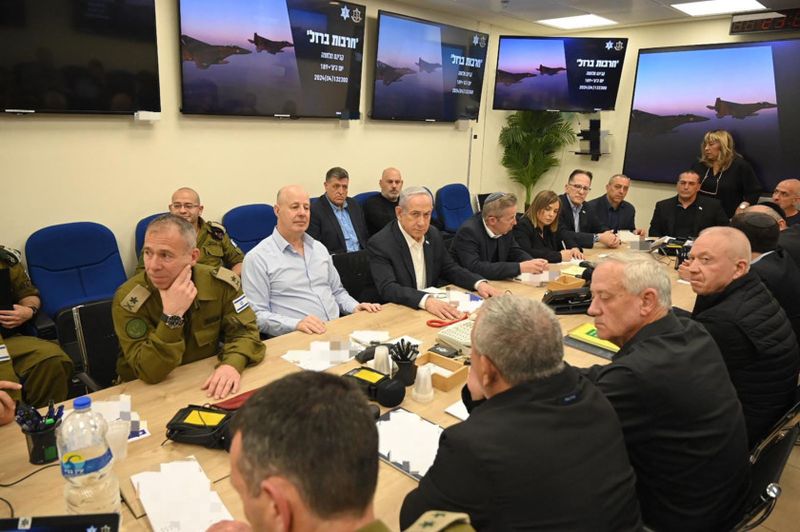
For most people in Israel, Iran is the puppet master of its regional foes, starting first and foremost with Hamas, the Islamist Palestinian group that attacked it in October, killing 1,200 and abducting 250 more, threatening the country to its very core.
Israel responded with an unforgiving war that is still underway. Some 33,000 Palestinians have been killed, according to Hamas, considered a terrorist organization by the US and European Union.
More than 100 hostages have yet to be freed and thousands of Hamas fighters are still entrenched in the southern Gaza city of Rafah.
Avi Melamed, a former Israeli intelligence officer who’s written extensively on Iran, said he hopes that after the Iranian attack, the US will be more sympathetic to Israel’s insistence on attacking Rafah and dismantling Hamas.
‘Bad news for everyone’
“If Hamas sees Iran’s attack and thinks it is still going to stay on its feet, that is bad news for everyone,” he said.
Finance Minister Bezalel Smotrich made a similar point in a post on X, saying, “It’s time to learn lessons, change direction, continue to Rafah now and restore full Israeli control all over Gaza.”
The US has been warning against such an operation because of the hundreds of thousands of civilians sheltering in Rafah and the growing humanitarian crisis in Gaza.
Hamas just rejected Israel’s latest offer for a ceasefire and exchange of hostages for prisoners, further evidence for some that Iran’s allies are feeling emboldened rather than frightened.
But Amos Yadlin, a former director of Israeli military intelligence who advises opposition leader and war cabinet member Benny Gantz, sees it differently.
“Last night’s attack could lead to a strategic change in the war and even to its end,” he said. “Hamas has been beaten hard enough, Israel can now agree to a deal on the return of all its hostages in exchange for a permanent ceasefire and withdrawal from Gaza and win back its international legitimacy.”
The other dilemma for Israel is its northern border with Lebanon where it’s fighting Iran-backed Hezbollah, and tens of thousands of civilians on both sides have been forced out of their homes. Israel sees Iran behind this conflict as well and says it must be able to return its citizens to their homes — either by diplomacy or by force.
So as it contemplates how to respond to Iran’s attack, Israel worries about not only its enemy hundreds of miles away but also those right on its borders.


